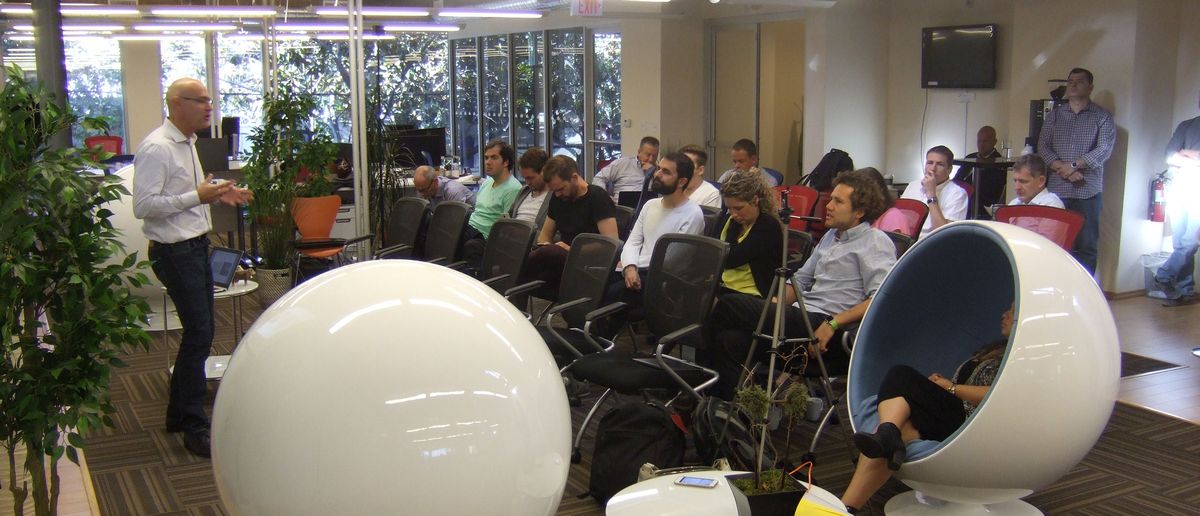
In Silicon Valley, hundreds of start-ups vie for the attention of investors and large companies. In this cauldron, the five Swiss winners of the Swisscom Startup Challenge face strong competition. However, they benefit from their world-class technology and the contacts established by Swisscom – but in marketing there is still room for improvement.
The Cowper Inn is a 19th century contemplative wood house in a green setting in the district of Palo Alto. But among the floral wallpaper, sofas and old books, the atmosphere of the hotel this Tuesday morning is hectic. The five winners of the Swisscom Startup Challenge plan their day, discuss their pitches and at the same time work on the most pressing tasks of their daily business. “We have already solved three urgent problems,” says Stijn Pieper of Advanon. He has not finished his breakfast.
The pace is characteristic of the entire Silicon Valley trip. On Monday, the five start-ups pitched for the first time before investors. On Tuesday, internet start-up Advanon had a first follow-up meeting with a donor. Similarly, the other winners too had an individual programme on Tuesday, with visits to potential business partners, which could distribute their product in the US, investors and a number of large companies, including Apple, Google, SAP, PWC and Accenture.
The form of the Swisscom Startup Challenge with its individual programmes for the winners is unique. “We did not want to create just another competition where the winners receive prize money,” says Roger Wüthrich-Hasenböhler. Swisscom’s Chief Digital Officer (CDO) is also in Silicon Valley to partially accompany the trip.
In order to set up the various appointments, Swisscom has activated its network in Silicon Valley. The telecoms group has had a local outpost (picture above) since 1998 and has a correspondingly tight-knit network of contacts. “At first, we were here to observe the trends; today, we are a bi-directional connection between Switzerland and Silicon Valley,” says Gregory Leproux, responsible for innovation and business development in the branch office.
A core element of the exchange is the Startup Challenge and accordingly much work is invested in it. Wüthrich-Hasenböhler estimates the value of the gain for a start-up as CHF 20,000 to CHF 30,000, and a considerable part of this effort is devoted to initiating individual contacts. “We have expanded this part of the trip each year, because it brings the most value to the start-ups,” he says.
In this fifth year of the competition, the start-ups go through their individual programmes on Tuesday and Wednesday. The group is together on Monday and Friday, but here again some start-ups break off to meet investors and business partners.
And when the group is together, the winners are not slow to fire questions at the speakers. For example, how best to maintain contact with someone met during the trip (answer: promise to provide further information within two weeks and then ensure you meet this deadline) or how to awaken the interest of someone in a conversation during an apéro (answer: provide valuable information; eg, on the most recent industry trends).
One thing was clear from the first day: the competition against which start-ups must prevail in Silicon Valley is tremendous. “They are up against not only the start-ups that are doing something similar, but also all the thousands of young companies that are looking for capital or manpower,” says investor Alex Fries. The Swiss has lived in San Francisco for many years and now has a fund that aims to build bridges between Switzerland and the US.
It was Fries who judged the pitches of the five start-ups on the first day of the trip, and his opinion turned out to be a little deflating. Too many talked too much about the technology, but too little about the team and the numbers. In addition, the pitches did not emphasise strongly enough the benefits of the products. “You have to show clearly what you make better, faster or cheaper,” Fries told the start-ups.
However, Fries definitely sees the qualities of the start-ups: the technology is better than that offered by Silicon Valley companies and they can be proud of the milestones reached in a short time. But the start-ups fall short in selling – and this is not a small point. “In my opinion, new companies need a marketing specialist in the team and hardly any Swiss start-ups have such a person,” he says.
The winners of the Startup Challenge take the criticism seriously and work alongside their programme and the daily business to improve the pitches – and they give it full throttle, because the next investor appointments are already planned. In order to present at a higher tempo, Advanon and Nanolive both arrived with two people; although they have had to pay for the flight and hotel for the second person themselves, it has proved to be a smart move.























































Please login or sign up to comment.
Commenting guidelines